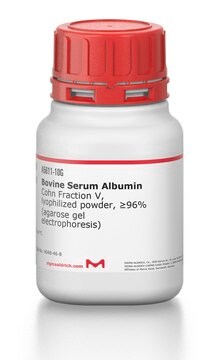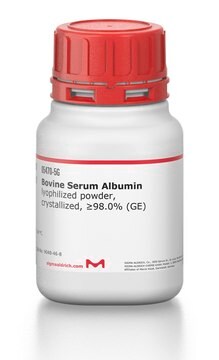05479
Bovine Serum Albumin
fraction V, essentially protease free, ≥92% (GE)
Synonym(s):
Albumin bovine serum, BSA, Bovine albumin
Sign Into View Organizational & Contract Pricing
All Photos(1)
About This Item
Recommended Products
biological source
bovine
Quality Level
Assay
≥92% (GE)
form
lyophilized powder
quality
essentially protease free
mol wt
~66 kDa
Mr ~67000
purified by
heat shock fractionation
loss
≤5% loss on drying
solubility
H2O: 40 mg/mL at 20 °C, clear to very faintly turbid, colorless to slightly yellow
H2O: slightly soluble
foreign activity
protease ≤0.005 U/mg
storage temp.
2-8°C
Looking for similar products? Visit Product Comparison Guide
Application
Albumin from bovine serum has been used for blocking the non-specific protein binding surface areas. It has also been used as a standard for evaluating the concentration of protein by using Bradford method.
Biochem/physiol Actions
Bovine serum albumin also referred to as BSA or Fraction V is a protein isolated from cows. BSA can block vacant binding sites in enzyme-linked immunosorbent assay (ELISA) in both poly-l-lysine (PLL)-treated as well as non-treated microwells. It can also triggers the insulin dependent diabetes mellitus.
Certain conformational and primary-sequence epitopes of BSA are suspected allergens in human beef and milk allergies.
Preparation Note
Initial fractionation by heat shock.
Serum albumin may be referred to as Fraction V. This naming convention is taken from the original Cohn method of fractionating serum proteins using cold ethanol precipitation. Serum albumin was found in the fifth ethanol fraction using Cohn′s method. Since then, the term "Fraction V" has been used by some to describe serum albumin regardless of the method of preparation. Others have used this term to describe serum albumin purified by ethanol fractionation methods that have been highly modified since the original Cohn method was described. Sigma-Aldrich manufactures and distributes serum albumins purified from a variety of primary methods including the true Cohn fractionation method, modified ethanol fractionation methods, heat shock and chromatography. Additional purification steps may include crystallization or charcoal filtration.
Other Notes
Sales restrictions may apply
Storage Class Code
11 - Combustible Solids
WGK
WGK 3
Flash Point(F)
Not applicable
Flash Point(C)
Not applicable
Personal Protective Equipment
dust mask type N95 (US), Eyeshields, Gloves
Choose from one of the most recent versions:
Already Own This Product?
Find documentation for the products that you have recently purchased in the Document Library.
Customers Also Viewed
Raphael J Gübeli et al.
Scientific reports, 3, 2610-2610 (2013-09-11)
The simplification of current vaccine administration regimes is of crucial interest in order to further sustain and expand the high impact of vaccines for public health. Most vaccines including the vaccine against hepatitis B need several doses to achieve protective
Andreas Menzel et al.
Lab on a chip, 13(21), 4173-4179 (2013-08-29)
Detecting drug-target interactions in real-time is a powerful approach for drug discovery and analytics. We show here for the first time the ultra fast electrical real-time detection and quantification of antibiotics using a novel biohybrid nanosensor. The biomolecular sensing is
J Karjalainen et al.
The New England journal of medicine, 327(5), 302-307 (1992-07-30)
Cow's milk has been implicated as a possible trigger of the autoimmune response that destroys pancreatic beta cells in genetically susceptible hosts, thus causing diabetes mellitus. Studies in animals have suggested that bovine serum albumin (BSA) is the milk protein
M Steinitz
Analytical biochemistry, 282(2), 232-238 (2000-06-30)
ELISA provides a highly sensitive procedure for quantitating antigens and antibodies. In that assay, microwells are coated initially with a specific ligand and then saturated with inert molecules to minimize nonspecific background. Coating can be improved by pretreating the microwells
Balázs Rada et al.
Journal of immunology (Baltimore, Md. : 1950), 181(7), 4883-4893 (2008-09-20)
The dual oxidase-thiocyanate-lactoperoxidase (Duox/SCN(-)/LPO) system generates the microbicidal oxidant hypothiocyanite in the airway surface liquid by using LPO, thiocyanate, and Duox-derived hydrogen peroxide released from the apical surface of the airway epithelium. This system is effective against several microorganisms that
Our team of scientists has experience in all areas of research including Life Science, Material Science, Chemical Synthesis, Chromatography, Analytical and many others.
Contact Technical Service




